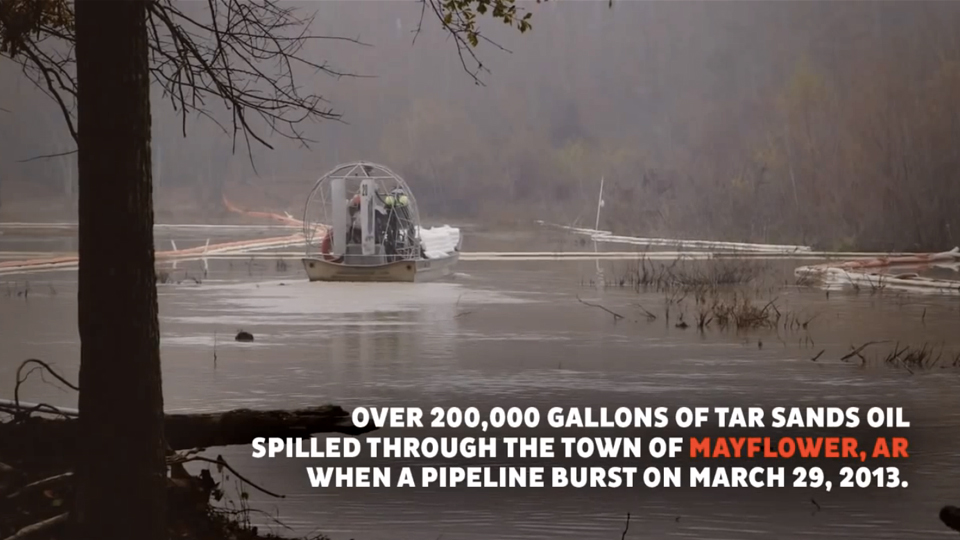A Nebraska judge Wednesday struck down a state law that allowed Gov. Dave Heineman to approve the route of the controversial Keystone XL pipeline, a decision that could significantly delay the $5.3 billion project.
Lancaster County District Judge Stephanie F. Stacy said the 2012 law violated the state constitution. She permanently blocked Heineman (R) and other defendants “from taking any action on the governor’s January 22, 2013 approval of the Keystone XL Pipeline route,” such as allowing land to be acquired by eminent domain for the project.
Stacy concluded that the state legislature could not take the routing power away from its Public Service Commission and allow Heineman to make the decision. More than 200 miles of the proposed pipeline, which would carry as many as 830,000 barrels of heavy crude oil daily from Canada to refineries in the Gulf of Mexico, would run through Nebraska.
The judge’s decision to overturn LB 1161, enacted in the final hours of the state’s 2012 session, means “there is no approved route across Nebraska now,” said David A. Domina, the lawyer who represented the three landowners who filed the lawsuit.
“This statute is the only statute we have out here that creates a procedure for getting a permit” for a pipeline, said Domina, who is running for U.S. Senate as a Democrat this fall.
“I am more or less ecstatic that we won this first round anyhow,” added Randy Thompson, one of the plaintiffs and co-owner of 400 acres of land in Merrick County. “A good day for me will be when I see TransCanada’s taillights cross the Canadian border, heading north.”
Heineman and the other defendants immediately appealed the ruling to the Nebraska Court of Appeals.
“I’m pleased that Attorney General [Jon] Bruning is appealing this decision,” Heineman said in a brief statement. “This is an important issue for the state of Nebraska.”
TransCanada, which is seeking permission from the U.S. State Department to build the 1,179-mile northern leg of the pipeline, issued a statement saying it disagreed with Stacy’s ruling and was disappointed by it.
“TransCanada continues to believe strongly in Keystone XL and the benefits it would provide to Americans — thousands of jobs and a secure supply of crude oil from a trusted neighbor in Canada,” spokesman Shawn Howard said.
Experts said that the ruling and subsequent appeal could push any final decision on the project until after the November election. It remains unclear whether the case will receive an expedited hearing, and the administration could choose to delay the process as it did in January 2012 when TransCanada was devising an alternative route around the Nebraska Sandhills, a sensitive habitat.
Environmentalists have seized on the pipeline as one of the most visible symbols of U.S. dependence on fossil fuels whose use they say is warming the planet. They repeatedly have demanded that the State Department and President Obama deny TransCanada permission to build the pipeline, in part as a way to slow the extraction of crude from oil sands in Canada.
Nebraska activists have expressed concern about oil spills from the pipeline, especially ones that could seep into the vast aquifer that supplies water for the state and others in that region.
They suffered a setback last month when the State Department’s final environmental assessment concluded that the pipeline would probably not alter emissions of global greenhouse gases. A official from the State Department said it would have no comment about the Nebraska decision because it is ongoing litigation.
The Nebraska law struck down Wednesday allowed TransCanada to seek approval of the project from the state’s elected five-member Public Service Commission or from Heineman. After approving the route, Heineman gave the pipeline company power of eminent domain to acquire land.
“I think TransCanada went to the governor because it was a sure bet. It was a political sure bet. It was faster and . . . there is no provision in the statute for appellate review of the governor’s decision,” Domina said.
But Stacy ruled that the state legislature could not pass such a law. “It is clear,” she wrote, “the Legislature cannot . . . divest the PSC of jurisdiction over a class of common carriers and vest such power in another governmental agency, body of government, or branch of government, except the Legislature.”
In addition to the court appeal, Nebraska activists said, the legislature could go back and pass another law restoring the PSC’s power to determine the route. That might require a special session, because the legislature is near the end of its 60-day 2014 session.
TransCanada also could give up or seek a route that does not go through Nebraska. Jane Kleeb, who has led the Nebraska opposition to the pipeline, speculated that the company might seek a route through Kansas instead.
But she said she now thinks the pipeline won’t be built. “I think the opposition is too strong. I think citizens have their eyes open now on how pipeline companies treat landowners.”
3 WAYS TO SHOW YOUR SUPPORT
- Log in to post comments

















